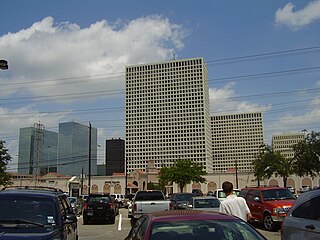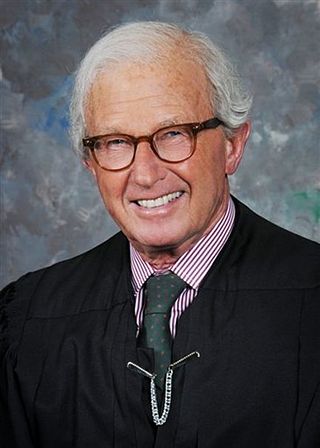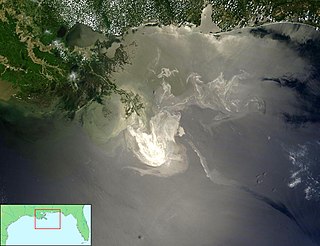
Transocean Ltd. is an American company. It is the world's largest offshore drilling contractor based on revenue and is based in Vernier, Switzerland. The company has offices in 20 countries, including Canada, the United States, Norway, United Kingdom, India, Brazil, Singapore, Indonesia, and Malaysia.

Deepwater Horizon was an ultra-deepwater, dynamically positioned, semi-submersible offshore drilling rig owned by Transocean and operated by BP. On 20 April 2010, while drilling at the Macondo Prospect, a blowout caused an explosion on the rig that killed 11 crewmen and ignited a fireball visible from 40 miles (64 km) away. The fire was inextinguishable and, two days later, on 22 April, the Horizon sank, leaving the well gushing at the seabed and causing the largest marine oil spill in history.

The United States offshore drilling debate is an ongoing debate in the United States about whether, the extent to which, in which areas, and under what conditions, further offshore drilling should be allowed in U.S.-administered waters.

Martin Leach-Cross Feldman was a United States district judge of the United States District Court for the Eastern District of Louisiana.

Offshore oil and gas in the Gulf of Mexico is a major source of oil and natural gas in the United States. The western and central Gulf of Mexico, which includes offshore Texas, Louisiana, Mississippi, and Alabama, is one of the major petroleum-producing areas of the United States. Oil production from US federal waters in the Gulf of Mexico reached an all-time annual high of 1.65 million barrels per day in 2017. Oil production is expected to continue the upward trend in 2018 and 2019, based on ten new oil fields which are planned to start production in those years. According to the Energy Information Administration, "Gulf of Mexico federal offshore oil production accounts for 15% of total U.S. crude oil production and federal offshore natural gas production in the Gulf accounts for 5% of total U.S. dry production."

The Deepwater Horizon oil spill was an industrial disaster that began on 20 April 2010 off of the coast of the United States in the Gulf of Mexico on the BP-operated Macondo Prospect, considered to be the largest marine oil spill in the history of the petroleum industry and estimated to be 8 to 31 percent larger in volume than the previous largest, the Ixtoc I oil spill, also in the Gulf of Mexico. The United States federal government estimated the total discharge at 4.9 MMbbl. After several failed efforts to contain the flow, the well was declared sealed on 19 September 2010. Reports in early 2012 indicated that the well site was still leaking. The Deepwater Horizon oil spill is regarded as one of the largest environmental disasters in world history.
The Macondo Prospect is an oil and gas prospect in the United States Exclusive Economic Zone of the Gulf of Mexico, off the coast of Louisiana. The prospect was the site of the Deepwater Horizon drilling rig explosion in April 2010 that led to a major oil spill in the region from the first exploration well, named itself MC252-1, which had been designed to investigate the existence of the prospect.

The Deepwater Horizon drilling rig explosion was an April 20, 2010 explosion and subsequent fire on the Deepwater Horizon semi-submersible mobile offshore drilling unit, which was owned and operated by Transocean and drilling for BP in the Macondo Prospect oil field about 40 miles (64 km) southeast off the Louisiana coast. The explosion and subsequent fire resulted in the sinking of the Deepwater Horizon and the deaths of 11 workers; 17 others were injured. The same blowout that caused the explosion also caused an oil well fire and a massive offshore oil spill in the Gulf of Mexico, considered the largest accidental marine oil spill in the world, and the largest environmental disaster in United States history.
The following is a timeline of the Deepwater Horizon oil spill. It was a massive oil spill in the Gulf of Mexico, the largest offshore spill in U.S. history. It was a result of the well blowout that began with the Deepwater Horizon drilling rig explosion on April 20, 2010.
The civil and criminal proceedings stemming from the explosion of Deepwater Horizon and the resulting massive oil spill in the Gulf of Mexico began shortly after the April 20, 2010 incident and have continued since then. They have included an extensive claims settlement process for a guilty plea to criminal charges by BP, and an ongoing Clean Water Act lawsuit brought by the U.S. Department of Justice and other parties.
This article covers the effect of the Deepwater Horizon disaster and the resulting oil spill on global and national economies and the energy industry.
Hornbeck Offshore Services v. Salazar is an ongoing case in United States federal court. In the wake of the Deepwater Horizon explosion and the subsequent oil spill, the U.S. Department of the Interior issued a six-month moratorium on exploratory drilling in deep water. Plaintiffs filed suit challenging the moratorium.
Following is a timeline of the Deepwater Horizon oil spill for June 2010.
Following is a timeline of the Deepwater Horizon oil spill for July 2010.
Following is a Timeline of the Deepwater Horizon oil spill for May 2010.
Reactions to the Deepwater Horizon oil spill from various officials and interested parties ranged from blame and outrage at the damage caused by the spill, to calls for greater accountability on the part of the U.S. government and BP, including new legislation dealing with preventative security and clean-up improvements.
Efforts to stem the Deepwater Horizon oil spill were ongoing from the time that the Deepwater Horizon exploded on April 20, 2010 until the well was sealed by a cap on July 15, 2010. Various species of dolphins and other mammals, birds, and the endangered sea turtles have been killed either directly or indirectly by the oil spill. The Deepwater Horizon spill has surpassed in volume the 1989 Exxon Valdez oil spill as the largest ever to originate in U.S.-controlled waters; it is comparable to the 1979 Ixtoc I oil spill in total volume released.
The Back to Work Coalition is a group of twelve offshore oil and gas industry stakeholders and trade associations, that have banded together to oppose the federal and regulatory policies placed on the industry following the Deepwater Horizon oil well explosion of April 2010. After the explosion, the Obama administration imposed a federal moratorium on deepwater drilling that lasted through mid-October 2010. The Back to Work Coalition was created in December 2010 to combat what the members believe is a "de facto" moratorium, caused by the federal government's hesitance in issuing drilling permits on the gulf's Outer Continental Shelf (OCS). The coalition was founded by Louisiana Department of Natural Resources (DNR) Secretary Scott Angelle. The coalition is facilitated by the Gulf Economic Survival Team (GEST), a non-profit organization created to restore Louisiana's economy following the moratorium.
The Deepwater Horizon investigation included several investigations and commissions, among others reports by National Incident Commander Thad Allen, United States Coast Guard, National Commission on the BP Deepwater Horizon Oil Spill and Offshore Drilling, Bureau of Ocean Energy Management, Regulation and Enforcement, National Academy of Engineering, National Research Council, Government Accountability Office, National Oil Spill Commission, and Chemical Safety and Hazard Investigation Board.
HWCG LLC is a not-for-profit consortium of deepwater oil and gas companies. HWCG maintains a comprehensive deepwater well containment response model that can be activated immediately in the event of a US Gulf of Mexico subsea blowout. It comprises oil and gas companies operating in the Gulf and incorporates the consortium’s generic well containment plan. HWCG has a healthy mutual aid component whereby HWCG members will respond and support another member’s incident.






